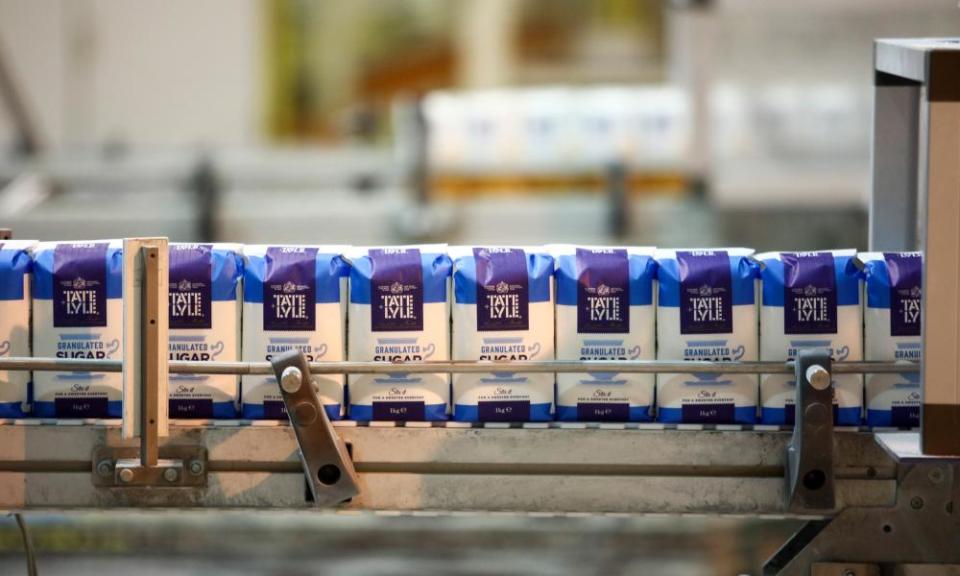Brexit backers Tate & Lyle set to gain £73m from end of EU trade tariffs

A company that backed Brexit and has donated to the Conservatives is in line to save £73m as the only direct beneficiary of a post-Brexit trade reform.
Under plans that will come into force at the end of the year, the government has confirmed that companies will be able to import 260,000 tonnes of raw sugar cane from anywhere in the world, tariff-free.
The only company that currently imports raw sugar cane, however, is Tate & Lyle Sugars – one of the only large employers that publicly backed Brexit. Its name also adorned the lanyards worn by attendees of the 2017 Tory conference. The sponsorship is recorded as an £8,000 donation by the Electoral Commission.
The new tariff-free quota equates to a £72.8m saving, according to analysis by Greenpeace’s Unearthed investigations team. The quota’s introduction comes after a long and public lobbying campaign by the company. Greenpeace said Tate & Lyle had held at least 10 meetings with senior ministers over the last three years.
The reform is the latest chapter in a Brexit subplot that has split the UK’s sugar industry. Tate & Lyle’s main rival makes sugar from sugar beets produced by British farmers. “This is all to do with them wanting to be able to import cane sugar more easily than they did before and it looks like the government has granted them their wish,” said Sam Lowe, senior research fellow at the Centre for European Reform thinktank.
“Tate and Lyle Sugars had a legitimate issue in that the only reason that these barriers existed was because the EU was trying to protect domestic sugar producers,” Lowe added.
Gerald Mason, senior vice president of Tate & Lyle Sugars, said that far from offering the company “state aid”, the tariff-free quota would actually begin to level the playing field after years of EU protection for sugar beet producers. “The logic that it’s Tate and Lyle’s quota is just wrong,” he said. “Anybody can import [raw cane sugar]. Anybody can refine it if they want to get into the industry.
“It’s not us that are going to get any money from this. It’s our competitors that have been subsidised by the EU all these years. What it will do is allow us to buy from some extra countries that we can’t buy from today. It’s not a cash subsidy. We would never buy from suppliers where we have to pay the full tariff, because it’s uneconomic.”
Ditching tariffs will boost imports from countries which use harmful pesticides banned in the UK
John Sauven, Greenpeace
Greenpeace accused Tate & Lyle of planning to use the new rules to import sugar cane from countries with lower employment and environmental standards. “This is a sweet deal for a food giant with close ties to the Conservative party and easy access to ministers, but it’s a bitter one for our environmental standards and farmers,” said John Sauven, Greenpeace’s executive director. “Ditching tariffs on raw cane sugar will boost imports from a handful of countries, all of which use pesticides banned in the UK for being harmful to wildlife and humans.”
However, Mason said it was “a complete fantasy” that Tate & Lyle wanted to import cheap, poorly produced sugar. “In Australia and Brazil, which are two countries we’d love to buy more from, they have the highest numbers of sugar producers who are certified for the highest ethical environmental standards in the world.
“We’ve never hidden our issues with Europe. We’ve been quite transparent about it. Yes, we have ministers visit the refinery to talk about the issues. We have Labour party politicians, we have Lib Dem politicians. Anybody who can help us secure the future of our business in the UK, we will speak to very openly and transparently.”
Paul Kenward, managing director of British Sugar, which refines beet sugar, said: “The UK has the opportunity to decide its own post-Brexit international trade policy – balancing the interests of all players in the market, including those of the homegrown beet sugar industry, developing countries and the refining sector. We simply do not understand how this policy squares with stated trade objectives, and we are asking the government serious questions about the policy and its implementation.”
The Department for International Trade had not responded to requests for a response by the time of publication.

 Yahoo Finance
Yahoo Finance 